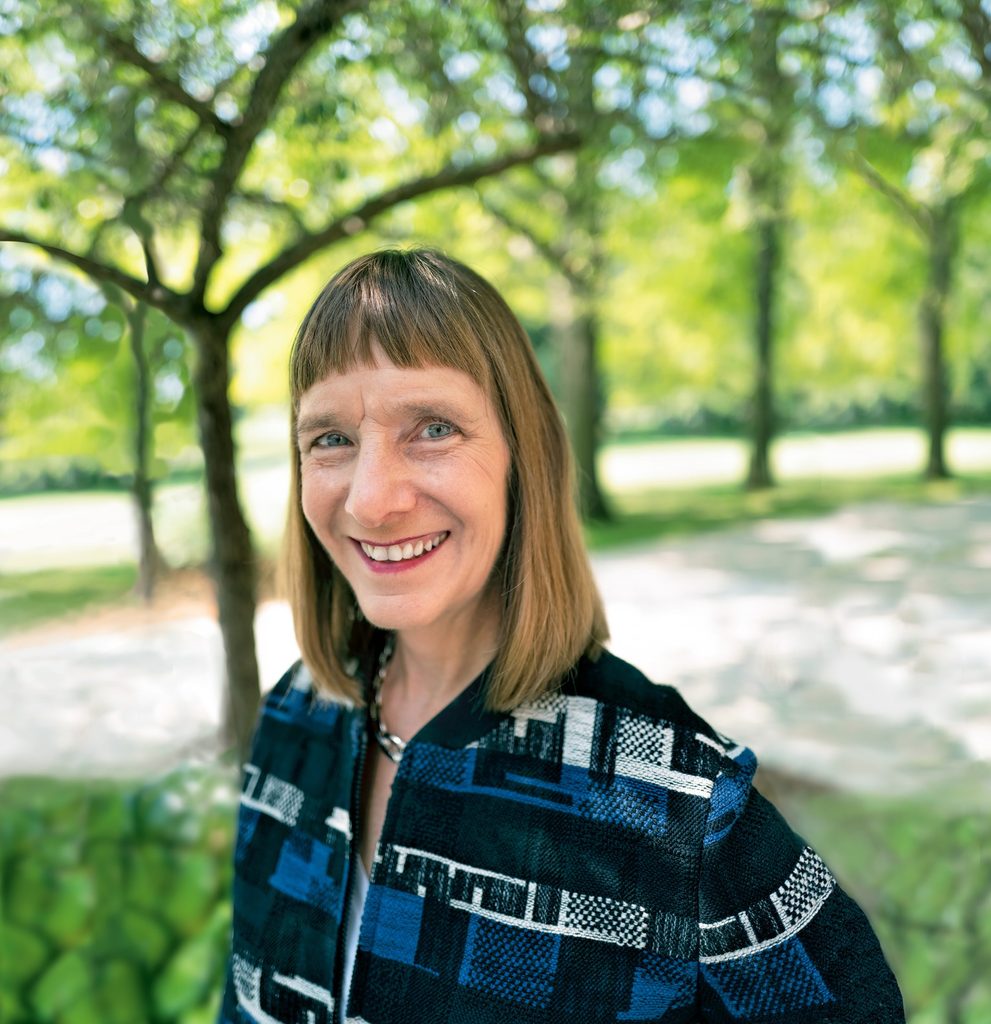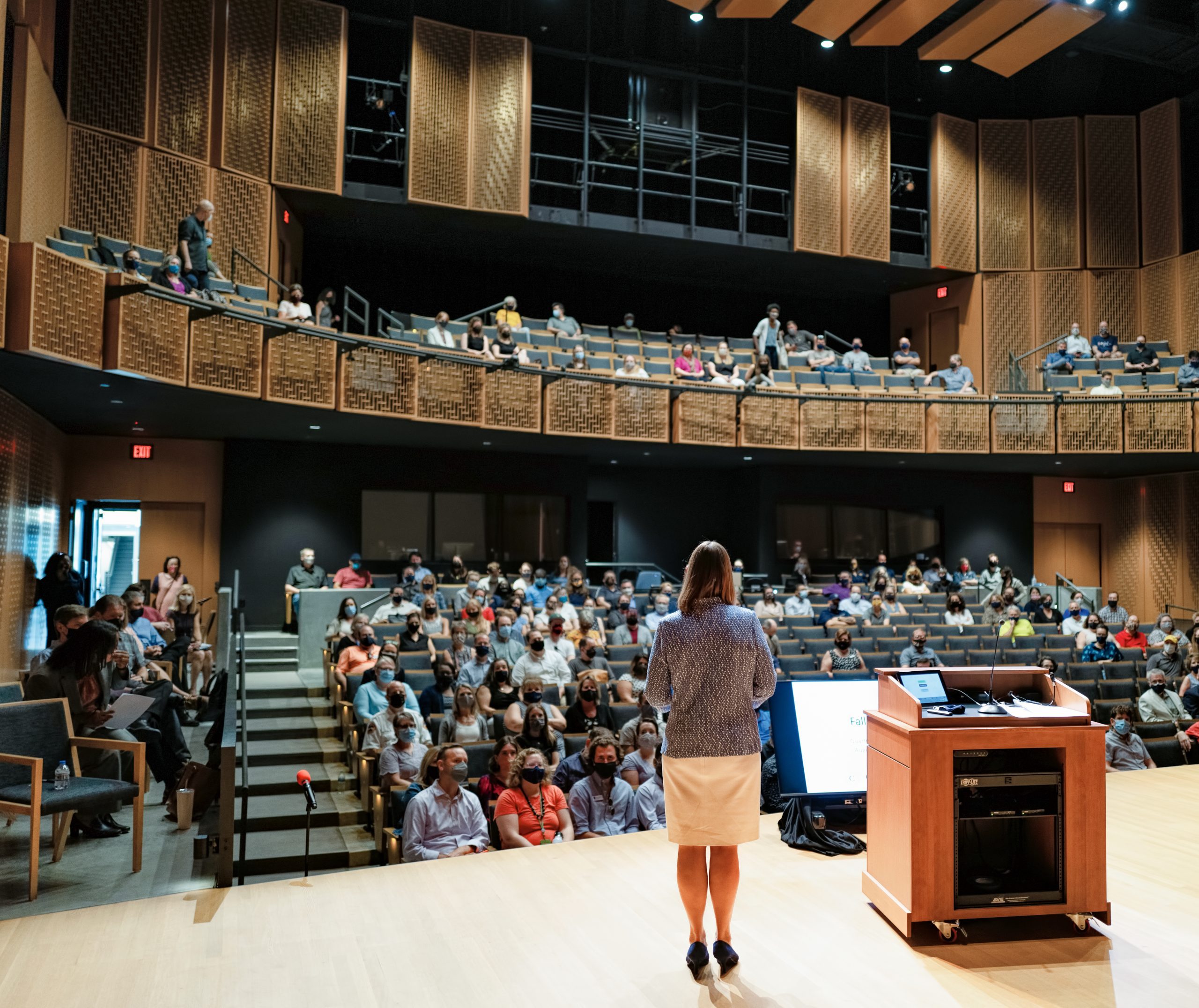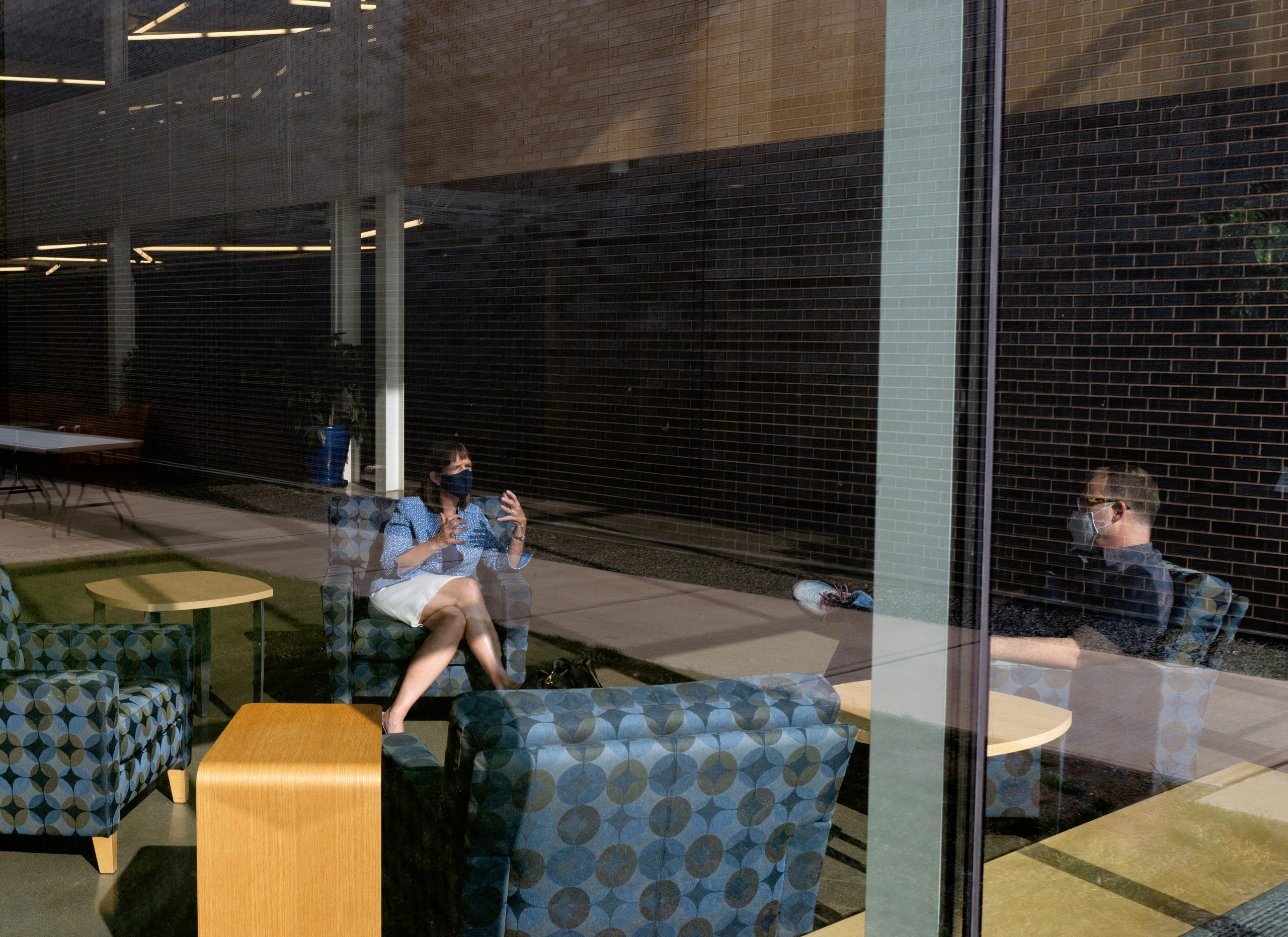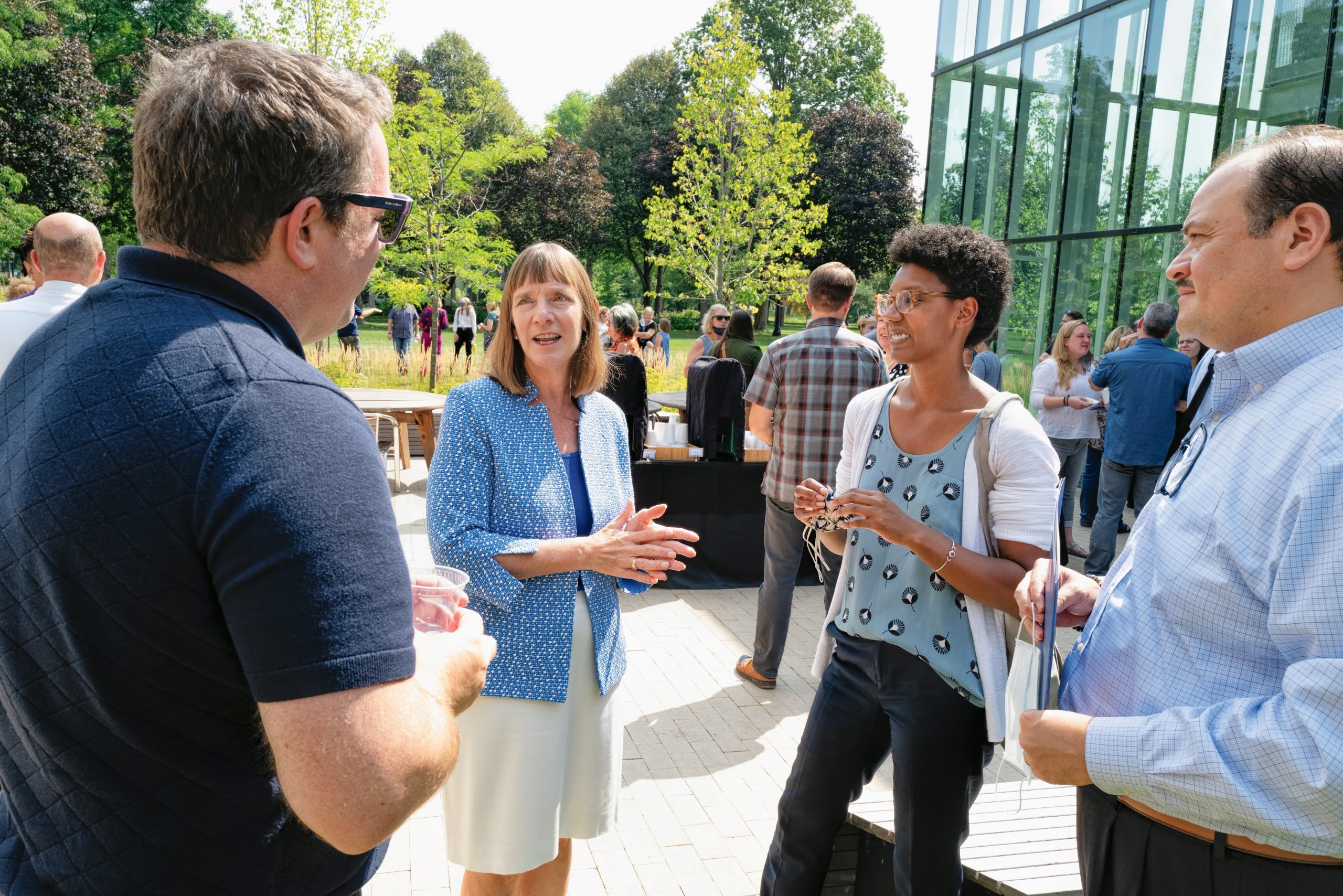As the pandemic plays out and liberal arts colleges look to the future, President Alison Byerly aims to fortify Carleton’s collective sense of purpose.

Shadowing Carleton President Alison Byerly P ’15 as she spiritedly navigates the leafy paths and humming hallways that enliven campus in early fall, it’s evident that her reputation as an enthusiastic, erudite, and approachable leader is legit.
At a noontime pizza party outside of Sayles, the 59-year-old trades favorite Ethiopian recipes with an international student who misses food from home and suggests they might try cooking together some time.

At the college’s first in-person, all-staff meeting in more than a year, Byerly, an English professor and former president of Lafayette College, introduces herself by expressing a heartfelt thanks to attendees for their “student-focused” sacrifices during COVID, promises transparency and an always open door, and then smiles easily when the morning’s question-and-answer period begins in silence. “Being a teacher, I’m not averse to calling on someone,” Byerly ribs. Ice broken, the chuckles that follow are accompanied by a host of raised hands.
Twice a President, Always a Professor
President Alison Byerly P ’15 holds a BA with honors in English, magna cum laude, from Wellesley College, and an MA and PhD in English from the University of Pennsylvania. During her tenure on Middlebury College’s faculty, she served as a visiting scholar at MIT, Stanford, and Oxford. “She’s a scholar, which helps her relate to other scholars,” says Tracie Addy, associate dean of teaching and learning at Lafayette. “She has an innate understanding of how a college’s bureaucracy can help faculty members perform at their best.”
Byerly’s scholarship focuses on interconnections among 19th-century British literature, art, and media. Her first book, Realism, Representation, and the Arts in Nineteenth-Century Literature (Cambridge University Press, 1997), examines the representation of a variety of arts — primarily painting, theater, and music — in Victorian novels. Are We There Yet? Virtual Travel and Victorian Realism (University of Michigan Press, 2012) connects the Victorian fascination with “virtual travel” through a variety of media with 21st-century experiments in virtual reality. She has continued to publish and to speak regularly at academic conferences during her time as president.
A recipient of numerous grants, scholarships, and awards, Byerly has also written and spoken widely on the role of technology in higher education.
At the school year’s first convocation, the avid cross-country skier (Byerly and her husband, Stephen Jensen, can’t wait to hit the trails) begins her remarks by referencing the beauty of Carleton’s “crown jewel”: Cowling Arboretum. Then — after making a point of reading and commenting on the college’s land acknowledgment statement, drafted a year ago to honor the Wahpekute and Mdewakanton bands of the Dakota Nation — she segues to the afternoon’s main theme, which promises to define her early days in office.
“It is important to recognize that the equitable and committed community we seek is not an option or an enhancement to the Carleton experience. It is absolutely fundamental to our ability to deliver a quality liberal arts education,” Byerly says. “Learning takes place through dialogue and exchange, among people with different backgrounds, identities, abilities, and interests, who share a desire for growth and change. It requires an environment of trust and belonging, where everyone feels valued and can show up as their full selves.”
For Byerly, building and maintaining community is not a flavor-of-the-month corporate catchphrase. It’s a career-tested, 360-degree ideal that’s consistently informed the bulk of her decisions, most recently at Lafayette and before that as a provost and executive vice president at Middlebury College, where she served from 2007 to 2012. And, as Byerly is quick to stipulate, community does not equate with conformity. Instead, like a truly representative democracy, it requires humility and demands intellectual rigor.
“Her concern is that a community be cohesive,” says Michelle Geoffrion-Vinci, a Spanish professor at Lafayette who served as head of foreign languages and literature during Byerly’s presidency. “That all the constituents and stakeholders feel welcomed and engaged in a larger, ongoing conversation, no matter how joyful or difficult.”
At Lafayette, Byerly presided over a $425 million capital campaign, opened an integrated science center not unlike Carleton’s, significantly increased the college’s financial aid budget, and oversaw a strategic plan that emphasized the growing importance of cross-disciplinary scholarship. “Our students, faculty, and staff became more diverse under Alison’s leadership,” Geoffrion-Vinci says. “We still have a long way to go. But before her arrival, this was an extremely homogenous environment. That has changed substantially.”
Tracie Addy, associate dean of teaching and learning at Lafayette, believes Byerly’s tenure as the college’s first female president (she’s blazing the same trail at Carleton) proved game-changing largely because of her ability to engage and connect — one-on-one, in front of an audience, in print, and on social media, where she maintains a robust Twitter account. “She’s someone to look up to in terms of how she communicates,” Addy says. “She’s very effective, very present, no matter the medium. She has a way of writing and speaking that is dynamic and personable and coherent.”
In the wake of George Floyd’s murder and amidst the attendant unrest, Byerly’s faith in community and skills as a communicator were stress-tested as Lafayette’s BIPOC students, faculty members, and alumni expressed their hurt and frustration with ongoing biases and inequities on campus. “It was a painful time and emotions were raw,” says Addy, who cowrote the 2021 book, What Inclusive Instructors Do. “Alison immediately addressed the issue in external and internal communications. She didn’t mince words or stray from taking a principled stand. And then there were next steps, including working groups on campus. I know that everyone involved, even those who disagreed with certain aspects of the process, appreciated the speed and depth of her response.”
Consensus building, says Byerly’s daughter Laramie Jensen ’15, is in her family’s DNA. “My mom comes from an academically focused household, where everyone could talk freely. As a result, she’s really open to other people’s opinions and stories. She’s good at synthesizing things while staying calm and connected. She has a lot of empathy and heart, but she doesn’t act impulsively. I try to emulate that balance.”
Laramie, who is conducting postdoctoral research in oceanography at the University of Washington, remembers having a hard time during her first year at Carleton. Her mother was on sabbatical and busy with research, but she dropped everything and flew to Minnesota for a parental visit. Mother and daughter walked the campus, hung out at Sayles, and tossed a Frisbee on the Bald Spot. “That visit with her was so nice. And before she left, she commented on how impressed she was with everyone’s intelligence and character. She told me, ‘I think you’re in good hands.’”
Now, it seems, Byerly is well-positioned to return the favor.

In a dedicatory piece synopsizing Alison Byerly’s transformative presidency at Lafayette (“Change Agent,” Lafayette magazine, spring 2021), Eric Ziolkowski, Helen H. P . Manson Professor of Bible at the college, is asked what it’s like to hear his former colleague hold court. “It’s remarkable to listen to her, because she crafts what she says so skillfully,” he says. “[She speaks] in neatly formed sentences, framed in perfect paragraphs.”
Ziolkowski is not exaggerating. Over the course of two hour-long interviews in August, Byerly — known for talking fast and thinking even faster — demonstrated that the best way to translate her thoughts is to quote her directly.
What first attracted you to academe?
I will confess to being a “faculty brat.” My mother was an English professor at Ursinus College in [Collegeville] Pennsylvania, and my father taught electrical engineering at one of Penn State’s campuses. So I always had the experience of spending time on their campuses. I enjoyed it when my mother would have students at the house to teach a seminar. I loved helping serve donuts and coffee and getting to hang around and listen to the students talk. I also loved going to work with her on snow days. As a young female professor with several kids in tow, she would sometimes hire students to babysit us. Along the way, I got to know my mother’s colleagues and came to appreciate being in a community where people are dedicated to studying the world together.
When did you know you wanted to follow in your parents’ professional footsteps?
I was active in student publications as an undergraduate at Wellesley College and pictured myself going into journalism. Then I began working on my senior honors thesis. Being in the library working on a long piece of writing, collaborating with my faculty adviser, having that dedication of purpose — it got me thinking I wanted to apply to graduate school.
I was fortunate to get into the University of Pennsylvania with a terrific fellowship. I’d been thinking maybe I would just get a master’s degree and see how it went, but as soon as I was there, I was pulled into the PhD track and never looked back.
You’ve been a provost and a president. What drew you to Carleton at this stage in your career?
I’d gotten to the end of a contract at Lafayette, we’d just finished a capital campaign, and I was meditating on what to do next. I love Lafayette, but it felt like if I was ever going to pursue another opportunity at an elite liberal arts institution, it was time to jump in. I sometimes joke that being a president is a cross between a job and a marriage. It’s a 24-hour-a-day commitment. And I think you’re most successful when you truly believe in the institution — that you understand the culture and feel really comfortable in it. When the Carleton search began, it seemed like a perfect convergence.
Was that a result of your daughter having attended Carleton?
That was a significant factor, but it wasn’t the only factor. One of our closest friends at Middlebury was a Carleton grad and Northfield native. Her family owned a farm near here and she always spoke so warmly of the area around the college. My sense was that it had all the excellence of other liberal arts colleges, but it lacked pretension and was less complacent than some.
How does complacency exhibit itself at other institutions?
Many colleges are so wedded to their traditions that it’s hard to move forward. But Carleton has this kind of midwestern ethos: always working at getting better, but never taking things for granted or taking itself too seriously. It’s little things. Every other school would call the Bald Spot the quad. Or the fact that longstanding administrative meetings have names like Tuesday Group, instead of president’s cabinet. Everything is sort of downplayed in a certain way. It’s not that excellence isn’t the goal, it’s just that the institution seems more open to the kind of evolution that colleges need right now.
That sort of mentality seems particularly important as we continue to grapple with issues of equity, diversity, and inclusion.
Carleton holds itself to an appropriately high standard. And over the past year people have taken to heart that there’s a missing piece here; that what many felt was a universally wonderful experience was less wonderful to some. That, of course, can make you question your own experience. You say, “What was I missing? If I was here 15 years ago and thought it was terrific, but now see on Instagram that a classmate or classmates felt that it was a racist experience, how did I contribute to that? What could I have done differently or better or not been blind to?” What’s happened on campuses all over the country has encouraged both self-criticism and institutional criticism in sometimes uncomfortable but essential ways. Here, I think that’s led to an especially robust conversation about how to further level the playing field and ensure that everyone has the best experience possible. It really is a moment of tremendous opportunity — because the entire institution is holding itself up to scrutiny, instead of pointing fingers at certain individuals or isolated incidents.
Now, that doesn’t mean you don’t hold individuals accountable. But it does mean you have to get beyond the tendency to focus on “this one thing happened or that one thing happened” and examine things systematically: whether it’s the ways in which we welcome new students during orientation, or the nature of our financial aid packages and whether we provide enough resources for a range of backgrounds. It also doesn’t mean the interpersonal work is any less important. Things like antiracism training and providing forums for people to share their individual experiences are essential. As an administration and an institution, though, we must also face structural issues that need to be improved. Sometimes I think people tend to focus on one or the other and not realize how they’re interconnected.
Where does financial aid rank on your list of initial priorities?
Financial aid is going to be a priority indefinitely, because the needs of students will continue to grow and the needs of the college to support those students will continue to grow. Financial aid ensures our capacity as a college to welcome as many students from as wide a range of backgrounds as possible, and while Carleton has very strong financial aid packages, there are things that we are now attentive to regarding the student experience that additional resources could help address, whether it’s more money for travel home, funding opportunities off campus, or extracurricular activities.
You are the first full-time woman president in school history. Has being a woman in traditionally male-dominated roles impacted the way you view issues of equity?
Since an increasing number of leadership roles have been occupied by women, it’s probably less jarring than it might have been years ago. But I do think there’s a sense in which the kind of authority that is associated with the role has, over time, been more naturally associated with men. Now, I wouldn’t want to over-emphasize or exaggerate my own experience, but I will say that I have had that sense of feeling less listened to because of my identity. Especially when I started off as a dean or provost and there were many meetings in which I might be the only woman sitting with 15 or 16 men. That immediately makes you more conspicuous. And I think it’s given me some sense of what it means to be both highly visible and somewhat disregarded at the same time. So I do hope that having some very slight insight into what it feels like to be an outsider in certain settings might help me think about how we, at a macro level, can make everyone’s experience at Carleton more welcoming.
Post-COVID, discussions about whether a liberal arts education is still viable have intensified. In your view, what continues to make the liberal arts invaluable?
Today’s liberal arts graduates are entering a world that has a lot of challenges, and they are well-prepared to face those challenges because they have the capacity to work through problems independently. Liberal arts students don’t have things fed to them. They aren’t asked to study things in a routine or mechanistic way. At Carleton we have a great STEM program combined with great strength in the humanities, so there’s a real emphasis on multidisciplinary thinking and collaboration. There’s also an amazing work ethic that is not elitist, arrogant, or complacent, but is first and foremost about living and learning together in community, and then going out to try and make the world a better place.
Do your experiences as a professor make it easier for you to relate to faculty members?
My faculty roots have always been integral to the way I hope to lead. To effectively work with faculty members you need to establish peer relationships. And I do think it made a difference at Middlebury and Lafayette that I understood the challenges of faculty life — and that I also relate to the sense of ownership and pride the best professors have in their institution. It’s essential that I not lose touch with that, and that I constantly refresh my understanding of the challenges the faculty is facing. If you’re going to ask people to be partners in running an institution, you have to create a real sense of shared governance.

What have you found that students most expect of their college president?
Different students want different things from the administration. I’ve found it very touching that — and I know this sounds kind of old-fashioned — students seem to respond very positively to a president who finds ways to show emotional leadership and commitment to the school. I’ve found that that connection is important when something bad happens and you need to pull the community together. It’s also important during moments of celebration.
How do you achieve that connection?
Being out and about on campus. The best conversations happen with students when they’re on their turf, not in a formal setting. I try to take advantage of everyday opportunities — waiting for coffee at Sayles, for instance — to chat and get a sense for the texture of student life. I also think students appreciate seeing you at a basketball game or at a theater performance. It’s a way for me to say, “This is important and you are what we’re all here for.”
Staff is an equally disparate and important constituency. What role do you hope to play in their day-to-day?
We are so fortunate at Carleton to have a dedicated, hardworking staff. Many people have been here for a long time. And yet, it’s possible that they sometimes feel overshadowed by the emphasis on academic programming and the accomplishments of faculty members. As president, I get to see people shoveling the snow early in the morning, and the dining staff serving midnight breakfast, and people in the registrar’s office hanging around late. Everybody cares deeply about the students in so many different ways. And there’s a special role for the president in helping to support and applaud those efforts.
Finally, how do you view your relationship with our alumni?
Alumni are a lifeline for the college and a great resource for a new president. They have such a depth of understanding of Carleton’s unique strengths and challenges. I’ve always found that to really understand a place you need to go back a few generations and see how you got to where you are. It sheds light on today’s experience. I also think that as the president, it’s my job to help everyone connect past, present, and future. In the case of alumni, that means helping people see that, okay, this is what Carleton was like when you were here in the ’70s or ’80s and here’s what it is today; that it’s changed, but it’s fundamentally still the same Carleton you know and love. It’s also important to emphasize with them that we must always grow and evolve, and to help establish that kind of throughline where they can see the continuity from their experience to what students are doing today. That’s what makes colleges like Carleton unique. It’s not a place you come and go for four years. It’s a membership and a club for a lifetime.
